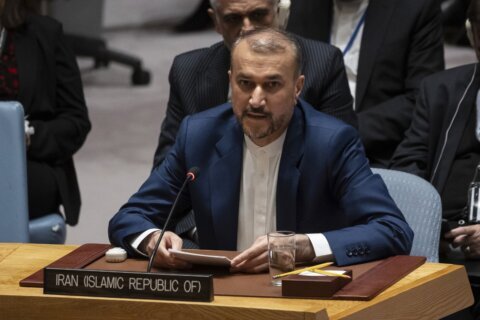CAIRO (AP) — Tribal leaders in southern Libya shut down the county’s largest oil field, authorities said Monday, the latest closure of an oil facility amid a bitter standoff between two rival governments.
Oil production at the Sharara field has been stopped and the state-run National Oil Corp. declared force majeure at the field, which produces around 450,000 barrels a day. Force majeure is a legal maneuver that enables a company to get out of its contractual obligations because of extraordinary circumstances.
The corporation called the shutdown of the field an “absurd move” that mirrors the ongoing standoff in the country. The closure will likely create a fuel crisis in the oil-rich country, as the field is one of the main sources of domestic fuel.
The corporation did not name those people behind the closure, but its announcement came a few hours after tribal leaders in the desert town of Ubari, about 950 kilometers (590 miles) south of the capital, Tripoli, said they shut down the field in protest against the government of embattled Prime Minister Abdul Hamid Dbeibah.
They called for Tripoli-based Dbeibah to hand over power to the government of Prime Minister Fathi Bashagha, who was appointed by the parliament in February to lead a transitional administration after Libya failed to hold its first presidential election in December.
Local media also reported that residents in the southeastern district of Whahat announced the closure of all oil facilities in their area, also to pressure Dbeibah to step aside.
Over the weekend, tribal leaders and protesters shut down the al-Feel field and the Zueitina terminal on the Gulf of Sirte, forcing the National Oil Corp. to declare force majeure at the two facilities. The closure of the terminal also forced the NOC to stop production in the fields of Abuatufol, al-Intisar, al-Nakhla and Nafura, the corporation said.
The Zueitina is one of four terminals of Libya’s Oil Crescent, a crucial area stretching from the eastern region of Ras Lanuf to the city of Sirte in the north central part of the country. The whole area is controlled by the east-based forces of military commander Khalifa Hifter.
Fawasel Media, a local news website, reported that the closures have brought Libya’s daily output to under 800 millions barrels a day, down from 1.2 billion barrels.
Along with crude oil production, the NOC said the closures will cause shortages of cooking gas and power supplies to the eastern region, also controlled by Hifter’s self-styled Libyan Arab Armed Forces.
Mustafa Sanallah, chairman of the National Oil Corp., said they were forced to stop production at all fields and stations associated with the terminal and shipping facilities until further notice.
He urged Libyans to push for the reopening of oil facilities to “benefit from the current boom in prices.”
The shutdown came as Brent crude, the international pricing standard, traded at $106.97 per barrel Monday as Russia’s war on Ukraine rattled global markets and caused oil prices to soar.
Libya’s prized light crude has long featured in the North African country’s civil war, with rival militias and foreign powers jostling for control of Africa’s largest oil reserves.
The oil-rich North African country has been wrecked by conflict since the NATO-backed uprising toppled and killed longtime dictator Moammar Gadhafi in 2011. The country has for years been split between rival administrations in the east and west, each supported by different militias and foreign governments.
Copyright © 2024 The Associated Press. All rights reserved. This material may not be published, broadcast, written or redistributed.







